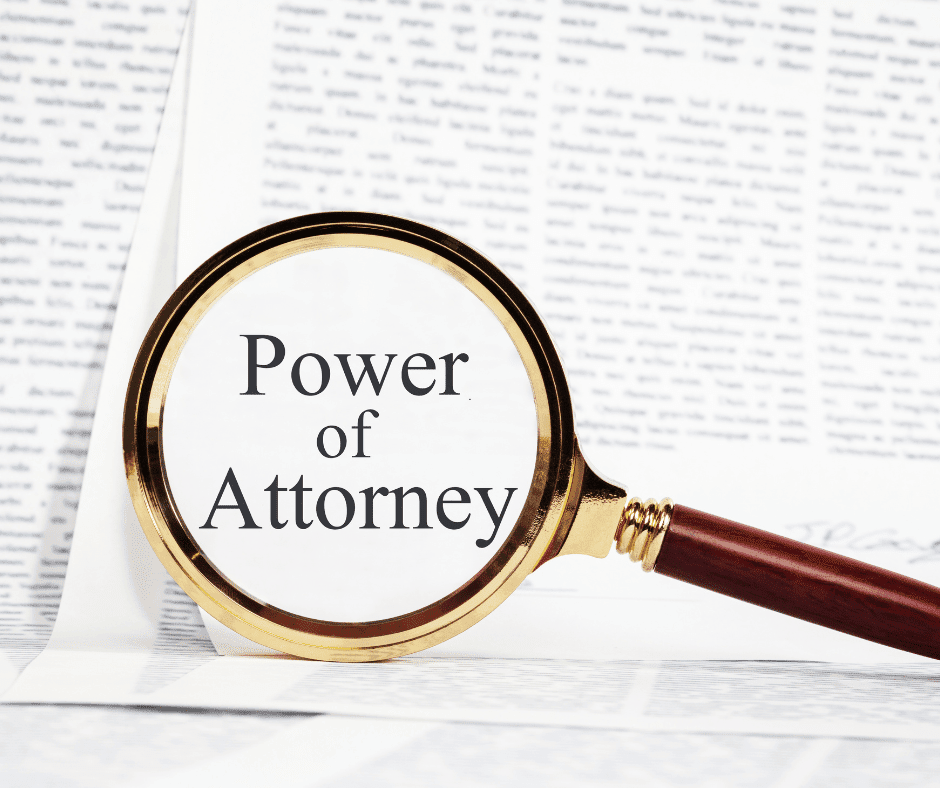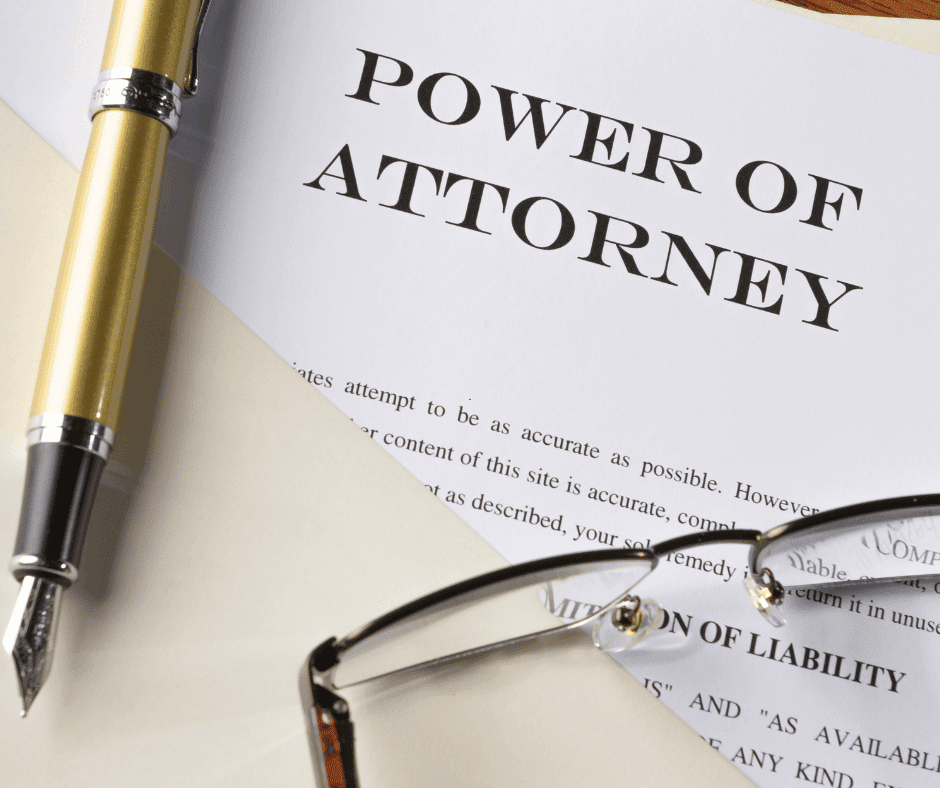Life can change in an instant. An illness, accident or decline in health could leave you, or a loved one, unable to make important decisions. That’s where Power of Attorney comes in. But what is power of attorney?
In this guide, you’ll learn:
- What Power of Attorney means in UK law
- The different types and when you might need one
- How to set up Power of Attorney, step by step
- Common mistakes to avoid
- How it fits into wider estate planning
By understanding “what is power of attorney” you’ll have peace of mind. Simply put, power of attorney ensures that if the unexpected happens, your finances, health, and future decisions stay in safe hands.
Whether you’re planning ahead or helping a loved one, this guide will help you make confident, informed decisions.

What is Power of Attorney?
Power of Attorney is a legal document that lets you give someone else the authority to make decisions on your behalf. These decisions can relate to your money, property, health, or personal welfare. It only comes into effect when you choose, or when you’re no longer able, to make decisions for yourself.
In this context, an attorney isn’t a lawyer. It’s a trusted person you nominate to act for you. This could be your spouse, adult child, sibling, or close friend.
You might need Power of Attorney in everyday situations like:
- You’re in hospital and need someone to manage your bank account or pay bills.
- You’ve been diagnosed with dementia and want to ensure future decisions are made by someone who knows your wishes.
- You travel abroad regularly and want a trusted relative to sign property documents while you’re away.
- You’re facing a serious illness or injury and want to prepare for the future.
Having Power of Attorney in place means your wishes are respected—even when you can’t speak for yourself.
Types of Power of Attorney
Different situations call for different types of Power of Attorney. Understanding these variations helps you choose the right option for your needs. Here are the main types used in the UK.
Ordinary Power of Attorney
An Ordinary Power of Attorney is a short-term arrangement. It gives someone the legal right to manage your financial affairs while you still have mental capacity.
People often use this when:
- They’re recovering from an operation and temporarily can’t manage their finances.
- They’re travelling or living abroad and need someone in the UK to handle property matters or pay bills.
- They need help managing day-to-day money due to age or illness but still understand what’s happening.
It only remains valid while you still have mental capacity. If you lose that capacity, this power ends immediately.
Lasting Power of Attorney (LPA)
A Lasting Power of Attorney (LPA) is designed for long-term use and continues even if you lose mental capacity in the future. It’s a key tool in estate planning and one of the most common types in the UK today.
There are two types of LPA, and you can set up one or both:
Health and Welfare LPA
This gives your chosen attorney the right to make decisions about your:
- Day-to-day care and routine
- Medical treatment, including surgery or medication
- Moving into a care home
- End-of-life decisions

This LPA only comes into effect if you can no longer make these decisions yourself.
Property and Financial Affairs LPA
This allows your attorney to manage your:
- Bank accounts and savings
- Pension and benefits
- Paying bills and managing debts
- Selling or maintaining your home
You can choose to activate this LPA immediately, or only if you lose mental capacity.
Setting up an LPA ensures your loved ones have the legal right to act quickly and effectively—without needing to go through lengthy court processes.
Enduring Power of Attorney (EPA)
An Enduring Power of Attorney is an older type of legal document. It was replaced by the LPA in October 2007. However, if you made and signed an EPA before that date, it’s still legally valid.
EPAs cover financial matters only. If you want someone to make health decisions for you, you’ll need to set up a separate Health and Welfare LPA.
Understanding the types of Power of Attorney ensures you choose the right protection for your future. Whether you’re planning ahead or need support now, the right legal document can give you peace of mind.
How Does Power of Attorney Work? (Step-by-Step Guide)
Setting up a Power of Attorney can feel overwhelming, but it’s simpler when broken down into clear steps. Here’s how to arrange Power of Attorney in the UK.
Step 1: Choosing Your Attorney(s)
Your attorney should be someone you trust completely. They must be over 18 and have the mental capacity to act. You can appoint:
- A family member
- A trusted friend
- A professional, such as a solicitor
You may also choose more than one attorney. In this case, decide whether they must act:
- Jointly (all must agree on decisions)
- Jointly and severally (they can act together or separately)
Choosing more than one attorney can offer flexibility and added protection, but be clear on how they’ll work together.
Step 2: Completing the Forms
To set up a Lasting Power of Attorney, you’ll need to complete official forms available from GOV.UK.
You can:
- Fill them in online and print them
- Request paper forms by post
You’ll need to provide details of:
- Yourself (the donor)
- Your chosen attorney(s)
- Any replacement attorneys
- A certificate provider (someone who confirms you understand the document and aren’t under pressure)
The current registration cost is £82 per LPA. You may qualify for a reduced fee or exemption based on income or benefits.
Common mistakes to avoid:
- Missing signatures or incorrect dates
- Forgetting to include preferences or instructions
- Using outdated forms
Taking care when completing the forms ensures no delays when you register.

Step 3: Registering Your Power of Attorney
Once completed, the forms must be sent to the Office of the Public Guardian (OPG) for registration. You can:
- Post the signed forms
- Use a solicitor to manage the process for you
How to register Power of Attorney in the UK:
- Double-check all pages for signatures and completeness
- Include the correct payment
- Send to the Office of the Public Guardian
Processing can take up to 20 weeks, depending on workload and errors. It’s best to register as soon as possible, even if you don’t need it immediately.
Step 4: Activation of the Power of Attorney
A Property and Financial Affairs LPA can take effect as soon as it’s registered—if you choose that option.
A Health and Welfare LPA only activates if you lose the mental capacity to make decisions.
In both cases, the attorney must act:
- In your best interests
- Following your instructions and any legal guidelines
- With a clear understanding of the Mental Capacity Act
This step-by-step process shows how to set up Power of Attorney with confidence. By planning early, you ensure your wishes are respected and your loved ones are supported.
Examples of Power of Attorney in Action
Power of Attorney isn’t just for emergencies or old age. It applies in many everyday situations. Here are a few relatable examples to help you understand how different types of Power of Attorney (POA) work in real life.
Scenario 1: Financial Help After a Stroke
Type of POA: Property and Financial Affairs LPA
Margaret, age 75, suffers a stroke that affects her ability to manage money. Her daughter, Sarah, is named as her attorney under a registered LPA.
Sarah steps in to:
- Pay bills on Margaret’s behalf
- Manage her pension and savings
- Arrange for carers and pay them regularly
Because the LPA was registered before the stroke, Sarah is legally allowed to manage her mother’s finances without court delays.
Scenario 2: Making Medical Decisions After Dementia Diagnosis
Type of POA: Health and Welfare LPA
John is diagnosed with early-stage dementia. He still has mental capacity, so he sets up a Health and Welfare LPA, naming his partner, Ben, as attorney.
A year later, John’s condition worsens and he can no longer make decisions. Ben uses the LPA to:
- Approve care home placement
- Speak with doctors about treatment options
- Make decisions in line with John’s previously expressed wishes
Because the LPA is registered and valid, Ben has full legal authority to act in John’s best interests.
Scenario 3: Temporary Help While Abroad
Type of POA: Ordinary Power of Attorney
Aamir works overseas for six months. While he’s away, he wants someone to handle his UK property sale. He sets up an Ordinary Power of Attorney, giving his brother temporary authority.
His brother can:
- Sign legal documents for the property sale
- Deal with estate agents and solicitors
- Transfer proceeds to Aamir’s account
Once Aamir returns, the POA ends, having served its short-term purpose.
Common Mistakes & How to Avoid Them
Setting up a Power of Attorney (POA) is a key legal step—but many people get it wrong. Here are the most common mistakes and how to avoid them:
Mistake 1: Leaving It Too Late
The risk: You can only make a POA if you have mental capacity. If you lose capacity (e.g. through dementia or injury), it’s too late.
How to avoid it:
Set up your POA as part of your general estate planning. Don’t wait for signs of ill health.
Mistake 2: Choosing the Wrong Attorney
The risk: Some people pick family out of obligation, even if they’re not financially responsible or trustworthy.
How to avoid it:
Choose someone reliable, organised, and who will act in your best interests. It doesn’t have to be a family member.
Mistake 3: Not Registering the POA
The risk: A Lasting Power of Attorney (LPA) must be registered with the Office of the Public Guardian (OPG) before it can be used.
How to avoid it:
Submit the completed form to the OPG as soon as possible. Registration can take up to 20 weeks.
Mistake 4: Using Outdated EPA Rules
The risk: Some people mistakenly use Enduring Power of Attorney (EPA) templates, not realising these were replaced in 2007.
How to avoid it:
Use the correct LPA forms from gov.uk to avoid rejection or legal issues.
Mistake 5: Not Being Clear About Instructions
The risk: Vague or missing guidance can cause confusion, disputes, or unintended decisions.
How to avoid it:
Use the guidance section in the POA form to include specific preferences. Consider writing a “letter of wishes” to explain your values.
Mistake 6: Failing to Notify Key People
The risk: Attorneys, family members, and medical professionals may not know the POA exists.
How to avoid it:
Inform your attorneys once the document is complete and give copies to relevant people, including your GP if it includes health decisions.
Mistake 7: Assuming Marriage Covers Everything
The risk: Many believe a spouse can automatically act on their behalf—this isn’t true for financial or medical decisions.
How to avoid it:
A formal POA is still required, even between spouses and civil partners.
Takeaway:
Setting up a POA isn’t just about filling in a form. Careful planning, clear communication, and proper legal steps ensure your wishes are respected when it matters most.

FAQs about Power of Attorney
How to become Power of Attorney?
To become someone’s Power of Attorney in the UK, you must be formally appointed using a legal document. The person making the Power of Attorney (called the donor) must choose you and complete the relevant forms. These forms must then be registered with the Office of the Public Guardian. Once registered, you will be legally authorised to act on their behalf.
I have Power of Attorney—now what?
If you have Power of Attorney, your role is to act in the donor’s best interests. Depending on the type, you may help with financial matters, health decisions, or both. You must always follow the rules set out in the Mental Capacity Act and keep clear records. If it’s a Lasting Power of Attorney (LPA), it must be registered before it can be used.
Can I revoke or amend a Power of Attorney?
Yes, a Power of Attorney can be revoked or amended at any time—if the donor still has mental capacity. To revoke it, the donor must write a formal revocation letter and inform the Office of the Public Guardian. To make changes, they will need to cancel the existing document and register a new one.
What happens if someone loses capacity without a Power of Attorney?
If someone loses mental capacity without a registered Power of Attorney, their loved ones cannot automatically make decisions for them. In this case, the family must apply to the Court of Protection to become a legal deputy. This process is often longer, more expensive, and more complex than setting up a POA in advance.
Power of Attorney and Estate Planning: How They Work Together
A Power of Attorney (POA) is a vital part of estate planning. It gives someone the legal authority to act on your behalf while you are still alive. This is different from a will, which takes effect only after death.
How Power of Attorney Supports Estate Planning
When thinking about the future, it’s not enough to plan who gets what after death. You also need to plan who will manage your affairs if you lose mental capacity during your lifetime. This is where POA fits in.
Power of Attorney can:
- Ensure your bills are paid and your assets are managed
- Allow someone you trust to make healthcare decisions
- Prevent delays and stress for your family if you can’t make decisions yourself
By combining a Power of Attorney with other tools (like wills, trusts, and life insurance)you create a complete, protective legal plan.
Related Roles in Estate Planning
- Executor of Estate: Named in your will to manage your estate after your death.
- Trustee: Appointed to manage assets held in a trust for beneficiaries.
- Attorney: Appointed under a POA to manage affairs during your lifetime.
- Deputy: Appointed by the Court of Protection if you lose capacity without a POA in place.
Each role is distinct but works together to protect your interests and ensure your wishes are carried out properly.
Regional Differences in the UK
While the core idea of Power of Attorney is similar across the UK, the legal process differs depending on where you live.
England and Wales
- Governed by the Mental Capacity Act 2005
- You apply for a Lasting Power of Attorney (LPA)
- Overseen by the Office of the Public Guardian (OPG)
More info: https://www.gov.uk/power-of-attorney
Scotland
- Uses a Continuing or Welfare Power of Attorney
- Must be registered with the Office of the Public Guardian (Scotland)
- Governed by the Adults with Incapacity (Scotland) Act 2000
More info: https://www.publicguardian-scotland.gov.uk/
Northern Ireland
- Uses an Enduring Power of Attorney (EPA)
- Registered with the Office of Care and Protection
- Governed by the Enduring Powers of Attorney (Northern Ireland) Order 1987
More info: https://www.nidirect.gov.uk/articles/managing-your-affairs-and-enduring-power-attorney
Wales
- Follows the same process as England
- LPAs are registered through the Office of the Public Guardian
Each region has its own legal forms, guidance, and registration bodies. So it’s essential to follow the correct process for your location.
Take Control with Power of Attorney
Here are the key things to remember:
- A Power of Attorney lets someone you trust act on your behalf if you lose mental capacity.
- There are different types depending on your needs—ordinary, lasting, or enduring.
- You can appoint more than one attorney and choose how they act together.
- The process involves choosing attorneys, completing forms, registering with the Office of the Public Guardian, and setting terms for when it takes effect.
- A POA works hand-in-hand with your will, trusts, and other estate planning tools.
- Legal rules differ slightly across the UK, so always follow the right steps for your region.
Setting up a Power of Attorney is not just a legal task. It’s a powerful step toward protecting your future and supporting those you care about.
Need help getting started?
Contact DMA Law today, and a member of our team will begin to get everything in place for you. We have experts specialising in probate, will’s and family law to help out with all matters. Early action ensures your wishes are clear, your loved ones are protected, and your affairs are managed with confidence.

